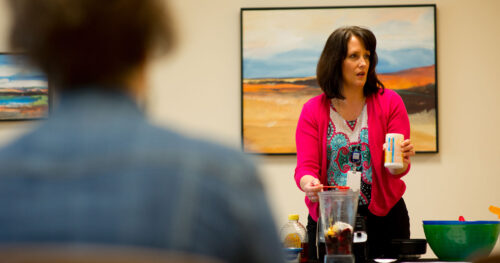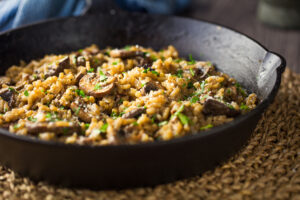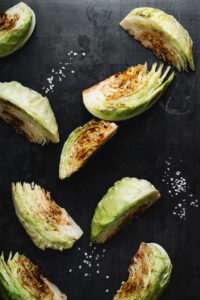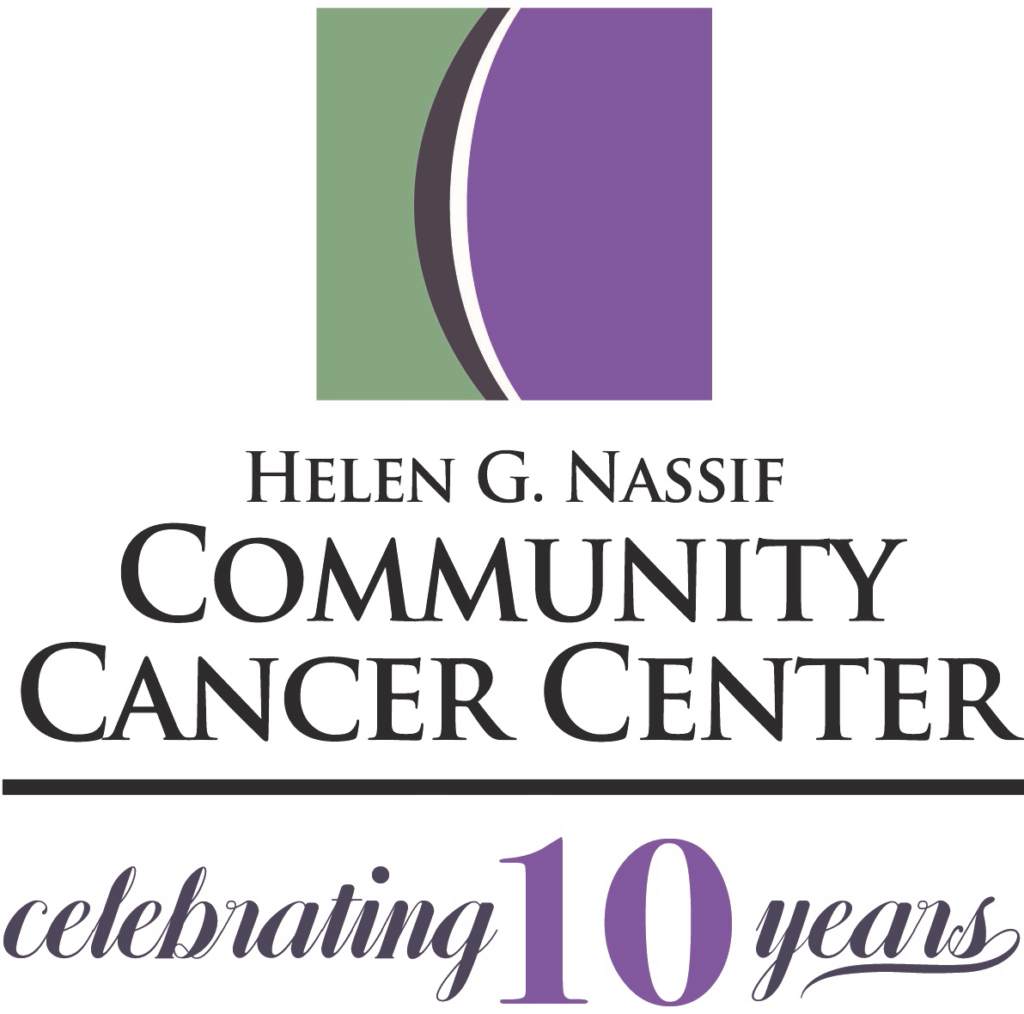
As part of our celebration of 10 years of the Nassif Community Cancer Center, our team members will give an inside look into the services available to our patients and how they can help them along the cancer journey.
Next up is Oncology Dietitians Beth Beckett, RD, CSO, LD, and Mary Beth Peiffer, RDN, CSO, LD, CDE, sharing more about the Nutrition Program the how it can help patients achieve better nutrition during and after treatment.
What Does an Oncology Dietitian Do?
Beth: Oncology dietitians help patients achieve better nutrition by supporting their individual needs in a variety of settings including medical oncology, radiation, and the wellness program. We do counseling about healthy eating for cancer prevention, advice on addressing malnutrition and treatment side effects, education on special diets, or managing feeding tubes for patients who are unable to eat by mouth. We also promote good nutrition through practical resources such as healthy recipes, cooking demonstrations, podcasts, newsletter articles and other programming. We function as part of the healthcare team including physicians, nurses, nurse practitioners, social workers to provide the best overall care for our patients. We play a variety of roles including educators, cheerleaders, event planners and care coordinators.
How are the dietary needs of cancer patients unique and how does nutrition consultation benefit patients at the cancer center?
Mary Beth: Each patient that is diagnosed with cancer has a unique treatment plan based on the patient’s goals and National Comprehensive Cancer Network (NCCN) guidelines. We dietitians use this treatment plan to guide our recommendations for each individual patient. Treatment plans can include any of the following therapies: chemotherapy, radiation, surgery, hormone modification, immunotherapy, and gene therapy. Any of these treatments can cause nutritional issues including decreased appetite, nausea/vomiting, bowel issues, dehydration, taste changes, swallowing problems, mouth sores, etc. We are able to talk through these side effects and give nutrition advice to counteract them. Many cancer patient experience weight loss related to their cancer or the treatments, and minimizing weight loss is usually recommended during treatment. We often encourage patients to eat more rather than less. Good nutrition is a way patients can feel more involved with their care, giving them a sense of control and empowerment. Our primary goal is to help our patients feel as best they can during a physically and emotionally challenging time.
Hear From Our Experts
Nutrition and Cancer
PODCAST EPISODE: 89
Beth Beckett, RD, CSO, LD, oncology dietitian at the Nassif Community Cancer Center, joins Dr. Arnold to discuss nutrition and its impact on cancer risk.
How has the nutrition program at the cancer center grown over the last 10 years?
Beth: When I came on board in 2012, I was the first dedicated outpatient oncology dietitian at Community Cancer Center. At that time, there still were many outpatient cancer centers that did not have dedicated dietitians, so it was an exciting time as I really enjoyed building the nutrition program with the help our director. Through working closely with our community partners, the nutrition program grew in a very short time. Being able to go to the clinics where the patients were located (vs having patients come to me) really helped, both in reaching more patients, getting to know the clinic staff, and feeling like an integral part of the team. Due to continued growth, Mary Beth came on board in 2014, and we added more patients when the Radiation Center opened in October 2015. We have been able to expand beyond individual patient care by adding cooking demonstrations, team events, and committee work such as feeding tube coordination and head and neck care process improvement.
How do you see the nutrition program advancing in the next 10 years?
Mary Beth: We foresee many changes in our future nutrition program in the future. The pandemic has illustrated that we need to increase our connectivity to our cancer survivors when in-person gatherings aren’t possible. In the future, we may be streaming our Cooking Demonstrations online so more survivors can easily access our nutrition outreach programs. We continue to expand involvement in the head and neck cancer population as nutrition is such an important factor for these patients. We expect that we will be a part of future committee work in feeding tube coordination and have discussed the possibility of a feeding tube clinic at some point.
Some other possibilities on the horizon include nutritional genomics. Also known as nutrigenomics, is a science studying the relationship between human genome, human nutrition, and health. Current work is ongoing toward developing an understanding of how the whole body responds to a food via systems biology, as well as single gene/single food compound relationships. It is the relationship between food and these inherited genes
Since the completion of the human genome project in April 2003, research projects into the effects of diet on the genome have grown exponentially. Currently, only about 10-15 percent of cancers have a genetic cause. We are already using each patients’ genetic variably to guide their recommended cancer treatment also. Preliminary evidence strongly suggests that the concept should work and that we will be able to harness the information contained in our genomes to achieve successful aging using behavioral changes; nutrition will be the cornerstone of this endeavor.
We anticipate an increase early nutrition counseling to prevent or delay cancer development. Conversely, many cancers are caused or compounded by lifestyle factors which can be changed if a patient is motivated to make this change. Here is an infographic that illustrates some of the factors we are talking about.
What is your favorite thing about being an oncology dietitian?
Beth: The two things that stand out for me are 1) working with amazing patients who impress me with their interest in nutrition and their positivity – even when facing something as life changing and scary as cancer, and 2) getting to work with an incredible team of people who are as caring as they are talented.
Mary Beth: I really feel rewarded when we can help our patients complete difficult cancer treatments. Particularly for our patients being treated for Head and Neck cancer, I tell them that my job is to “help them make it through” the treatment- day by day.
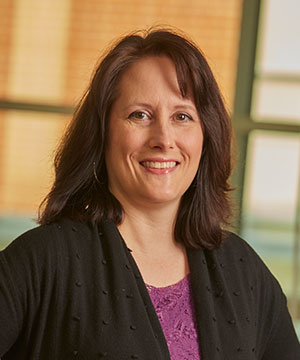
Beth Beckett
RD, CSO, LD
Beth has been an oncology dietitian with the Community Cancer Center since January 2012.
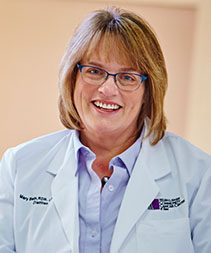
Mary Beth Peiffer
RDN, CSO, LD, CDE
Mary Beth has been an oncology dietitian with the Community Cancer Center since December 2014.




